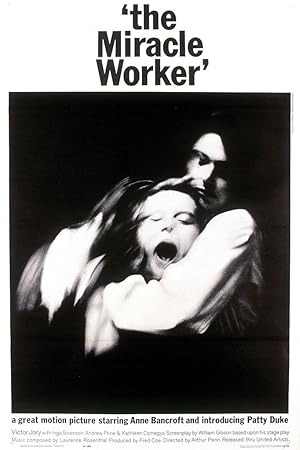
The Miracle Worker Soundtrack
Synopsis: Young Helen Keller, blind, deaf, and mute since infancy, is in danger of being sent to an institution. Her inability to communicate has left her frustrated and violent. In desperation, her parents seek help from the Perkins Institute, which sends them a "half-blind Yankee schoolgirl" named Annie Sullivan to tutor their daughter. Through persistence and love, and sheer stubbornness, Annie breaks through Helen's walls of silence and darkness and teaches her to communicate.
Director(s): Arthur Penn
Production: MGM Home Entertainment
Won 2 Oscars. Another 9 wins & 11 nominations.
- NOT RATED
- Year:
- 1962
- 106 min
- 1,226 Views
| # | Song | Duration |
|---|---|---|
| 1 | End Title | |
| 2 | Hands | |
| 3 | Lullaby | |
| 4 | Main Title | |
| 5 | Nightmare | |
| 6 | Percy | |
| 7 | Teaching | 4:48 |
| 8 | The Keys | |
| 9 | The Miracle | 2:50 |
| 10 | The Train | 3:20 |
Citation
Use the citation below to add this page to your bibliography:
Style:MLAChicagoAPA
"The Miracle Worker" Scripts.com. STANDS4 LLC, 2025. Web. 19 Jan. 2025. <https://www.scripts.com/soundtrack/the_miracle_worker_20863>.


Share your thoughts on The Miracle Worker's soundtrack with the community:
Report Comment
We're doing our best to make sure our content is useful, accurate and safe.
If by any chance you spot an inappropriate comment while navigating through our website please use this form to let us know, and we'll take care of it shortly.
Attachment
You need to be logged in to favorite.
Log In